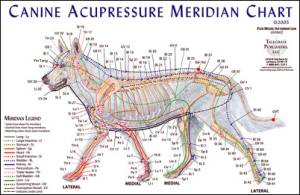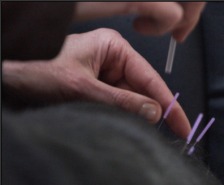Acupuncture (as well as other holistic treatments like acupressure, chiropractic care, Chinese herbs, natural stem cell enhancers, message, Reiki, and ACT allergy treatments) for dogs, cats and other pets are gaining popularity around the world as an alternative or complementary non-medicated treatment.
What is Acupuncture?

Picture Source: http://www.lhasaoms.com
Just One More Pet: Acupuncture is a non-drug treatment modality that was developed about 5,000 years ago by the Chinese. By inserting tiny metal needles into specific points (called "acupoints") in the body, these doctors in the early days discovered that they could cause physiological changes, control and suppress pain, and stimulate organs or body parts.
Acupoints are not random but run along "meridians", which connect the entire body and are the pathways through which the "Qi" (pronounced as "chee"), or life force energy, circulates. Although the meridians run deep in the body, they surface at certain points on the skin. These acupoints are where the meridians can be accessed in order to create change in the associated organs or structures. According to Chinese acupuncture literature, there are 12 major meridians and 365 acupoints in the body.
In Eastern medicine, it is theorized that disorders or diseases occur when the "Qi" is out of balance. Acupuncture is one treatment option that can be used to rebalance the body and create harmony of Qi.
Acupuncture forms part of an ancient Chinese method of diagnosis and treatment known as Traditional Chinese Medicine (TCM). (Besides acupuncture, TCM includes the use of herbs, medical massage, food therapy, and other therapies to rebalance the "Qi".)
In acupuncture for dogs, the "acupoints" which veterinary acupuncturists use are sometimes called "transpositional points", the locations of which are transposed to canines from the human acupoints.
What Kind of Illnesses Can Be Treated by Acupuncture for Dogs?
Acupuncture is NOT appropriate for major acute diseases or emergencies (e.g. broken bones, overwhelming viral or bacterial infections).
Image Credit: CLINT EGBERT/XPRESS
However, it is a great alternative or complementary treatment for chronic diseases.Acupuncture for dogs can be used to treat a variety of dog health conditions, mainly for pain relief (e.g. caused by osteoarthritis or injuries, etc.) and for treating dogs with neurological conditions, such as epilepsy. However, there are other dog health issues that can benefit from acupuncture as well.
You may want to consider canine acupuncture if your dog is suffering from any of the following problems:
- Musculoskeletal Problems: osteoarthritis, hip dysplasia, chronic degenerative joint disease, intervertebral disc disease, tendonitis, sprains and muscle spasms.
- Neurological Problems: epilepsy, stroke, deafness, coma, paralysis from disc disease.
- Urinary Disorders: incontinence, cystitis, urine retention.
- Gastrointestinal Problems: colitis, chronic idiopathic diarrhea or vomiting, gastroenteritis, rectal prolapse.
- Respiratory Disorders: sinusitis, rhinitis, asthma, chronic coughing, pneumonia.
- Systemic Inflammatory Conditions: chronic skin inflammation, allergies,lick granulomas.
 What Does an Acupuncture Treatment Involve?
What Does an Acupuncture Treatment Involve?

Picture Source: http://www.fourpawsacupuncture.com
Each treatment is individualized to each dog patient. The acupoints selected, the number of needles, and the length of treatment all depend on the type and severity of the dog's condition.
Acupuncture for dogs is usually performed with small, tiny metal needles.
Most dogs do not mind (and do not even feel) the needles being inserted. Most of them seem to feel relaxed and comfortable. Some go right to sleep during treatment!
Generally speaking, one treatment lasts for 10 to 20 minutes. Most cases are seen once or twice a week at first, after which the number of treatments can be reduced depending on progress.
Besides metal needles, there are some variations that are proving quite successful as well, including:
- Aquapuncture: This involves injecting the acupoints with a solution of vitamin B12 and saline. The solution puts pressure on and thus stimulates the point for a longer period of time and is a good technique to use if the dog does not want to stay still for 20 minutes.
- Electroacupuncture: This involves connecting electrodes from a small battery-operated unit to the needles in different acupoints. A very gentle current is passed through the points and down the meridians. This type of treatment encourages the flow of energy, blood and lymph along the meridians and speeds up healing.
- Laser Acupuncture. This involves the use of lasers rather than needles on acupoints and can be beneficial for dogs who absolutely don't want anything to do with needles.
- Moxibustion: This is a very old Chinese treatment modality that involves heating the acupuncture needles with a dried herbal incense. It stimulates blood flow and can be an excellent treatment for older arthritic dogs with sore and stiff joints and tight muscles.
Safety and Effectiveness of Acupuncture for Dogs
Acupuncture for dogs is very safe IF the acupuncturist has received formal training, and most importantly, is licensed.The effectiveness of canine acupuncture depends on a few factors, such as:
- The acupuncturist's experience and technique.
- The condition of the dog, e.g. how long the dog has been sick, and how serious the health problem being treated is.
- The number, length and consistency of treatments.
 Cat Getting Acupuncture - Image Credit: CLINT EGBERT/XPRESS
Cat Getting Acupuncture - Image Credit: CLINT EGBERT/XPRESS
Occasionally a positive response may be seen after only one treatment, but more often than not, 4 to 6 treatments are needed. Sometimes it can take up to eight treatments before results can be seen.
According to Dr. Karen Becker (a holistic vet who also uses pet acupuncture in her practice), about 25% of patients have a very positive response to acupuncture, showing major improvement to the point of fully recovering from the condition. Another 50% of patients experience dramatic improvement but with some symptoms remaining; while 25% have no response at all.
If you look at these figures, it seems that acupuncture works quite well on a rather high percentage of patients. It is definitely worth giving this treatment modality a try.
(Our dogs have experienced acupuncture, acupressure, chiropractic care as well as having taken Chinese herbs and StemPets stem cell enhancers and Goji Juice. I have a cousin whose dog avoided back surgery because of acupuncture and both my husband and daughter have had successful experiences with acupuncture and other natural treatments.)
Where Can I Find Acupuncture Veterinary Professionals?
If you are interested in acupuncture for your dog, ask your holistic vet or access the websites of The American Academy of Veterinary Acupuncture or International Veterinary Acupuncture Society.Here is an informative video in which Dr. Becker talks about pet acupuncture:
Give your pets a head start for a healthier, happier and longer life with StemPets and StemEquine – Stem Cell Enhancers for Pets
Related:
Alternative Dog Arthritis Treatment Series Part 1 – An Introduction
Dog and Cat Vaccines are Not Harmless Preventive Medicine
Laser Therapy is Good Medicine for Humans and Their Companion Animals… Any Animals
Natural Pet Remedies For Everyday Problems
No comments:
Post a Comment